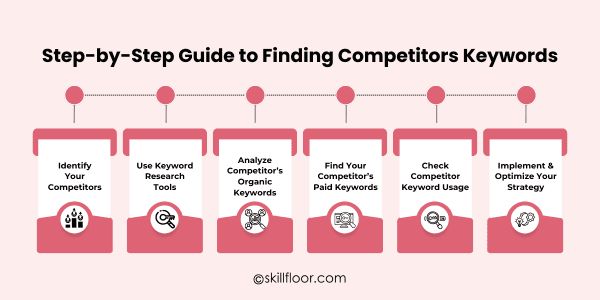How to Find a Competitors Keywords
Learn simple ways to find your competitor’s keywords using free and paid tools. Boost your SEO and get more traffic

Why do some websites get a higher ranking than others? Competitor keyword research is a tool used by marketers and successful companies to identify the best keywords and increase traffic. Numerous businesses that study and implement the tactics of their rivals experience rapid increases in traffic and rankings, which helps them maintain their lead and expand their online consumer base.
Businesses may discover competitors keywords and raise their ranks with the use of top SEO tools like Ahrefs, SEMrush, and Google Keyword Planner. To keep ahead of the competition, experts like John Mueller of Google advise conducting frequent keyword research. Utilizing the appropriate technologies helps you maintain your website's visibility, competitiveness, and growth in search results when search trends change.
Effective SEO technologies and moral business practices allow companies to expand without running the danger of fines. Competitor keyword research adheres to Google's policies, guaranteeing secure and efficient outcomes. Businesses can maintain the integrity and credibility of their SEO strategy while producing great content, raising their ranks, and drawing in more customers by concentrating on trustworthy data.
What is Keyword Research?
Researching keywords is the process of identifying the terms and phrases that people enter into search engines. It assists companies in knowing what their target audience wants and producing content that appeals to them. Websites that use the appropriate keywords can rank better on Google and draw in more visitors.
Effective keyword research enables companies to remain ahead of the competition and target the appropriate audience. It entails identifying easily ranked keywords with a lot of traffic and little competition. Websites may raise their exposure, boost SEO, and generate more organic traffic without investing in advertising if they follow the correct plan.
The Importance of Keyword Research in SEO
-
Helps You Understand Your Audience: Research on keywords reveals what people look for online. Understanding their interests can help you provide material that engages them and provides answers to their queries.
-
Improves Search Engine Rankings: Search engines can better comprehend your material if you use the appropriate keywords. People will reach your website more easily as a result of your increased possibilities of ranking higher.
-
Boosts Organic Traffic: Without using sponsored advertisements, visitors might be drawn in by focusing on pertinent keywords. A well-thought-out SEO strategy saves money on marketing by bringing steady, long-term traffic to your website.
-
Supports Content Strategy: Your content ideas are guided by selecting the appropriate keywords. To increase interaction, you may create product pages, blog pieces, and tutorials depending on user searches.
-
Enhances Digital Marketing Efforts: Researching keywords is crucial for SEO, PPC, and social media tactics in digital marketing. It assists in producing content that fits the trends and demands of the audience.
-
Gives You a Competitive Edge: You may improve your approach by being aware of the terms that your rivals employ. Finding gaps, focusing on less competitive keywords, and gradually raising your ranks are all possible.
What are Competitor Keywords?
Keywords that comparable businesses rank for on search engines are known as competitor keywords. You may learn what works for these keywords by evaluating them, then use that knowledge to enhance the SEO of your website and draw in more visitors and possible clients.
Finding keyword gaps and focusing on less competitive but still appealing search phrases are made possible by using competitors' keywords. Knowing competitor's keywords enables you to improve your content, optimize your website, and maintain your lead in search results while connecting with the correct audience, whether you're selling goods or providing digital marketing courses.
The Role of Competitor Keyword Analysis in Digital Marketing Strategy
-
Helps Identify Winning Keywords: Analyzing competitor keywords reveals which terms bring customers to other companies. In order to raise the ranks and exposure of your website, this assists you in identifying high-performing search phrases.
-
Improves SEO Strategy: You can improve your SEO strategy by knowing what works for your rivals. For higher search engine ranks, you may enhance your content and target pertinent keywords.
-
Boosts Content Planning: Trending themes can be found by examining competitors keywords. This aids in producing interesting content that draws more users to your website and maintains their attention.
-
Saves Time and Effort: Research on rival keywords provides precise information rather than conjecture. Instead of experimenting with random search phrases, you may concentrate on tried-and-true keywords that generate traffic.
-
Enhances Paid Advertising: Understanding the terms that competitors use in their advertisements might help you make your sponsored campaigns better. By bidding on the appropriate terms, you may increase the return on your investment.
-
Gives a Competitive Advantage: Using clever tactics is essential to staying ahead in digital marketing. By analyzing competitor keywords, you may identify holes in the market, improve your strategy, and outperform your competitors.
The Challenges of Finding Competitor Keywords
-
Limited Access to Data: Businesses are forced to rely on SEO tools like Ahrefs or SEMrush, which may not always offer 100% correct data, because competitors do not publicly disclose their keyword tactics.
-
Organic vs. Paid Keywords Confusion: While some keywords are utilized in paid advertising, others generate free organic traffic. For a PPC and SEO plan to be successful, it is essential to distinguish between them.
-
Highly Competitive Markets: Due to intense competition, it might be challenging to rank for certain keywords in popular sectors. It takes more investigation and analysis to find high-traffic, low-competition keywords.
-
Constant Algorithm Changes: Keyword rankings are affected by Google's periodic algorithm changes. A keyword that is effective now can become less so later; therefore, it has to be continuously watched.
-
Keyword Research Tool Limitations: While premium tools might be pricey, free ones only offer a limited amount of data. Advanced keyword research tools may be too expensive for small organizations.
-
Finding the Right Keyword Intent: Not every high-ranking term generates a convert. Knowing if a term is transactional, navigational, or informative is crucial to focusing on the appropriate audience.
Step-by-Step Guide to Finding Competitors Keywords
1. Identify Your Competitors
You must identify your competition before you begin keyword research. Two categories of competitors are out there:
-
Direct Competitors: These are companies that offer comparable goods or services to your own. Nike, Adidas, and other shoe labels are your competitors, for instance, if you own an online shoe store.
-
Indirect Competitors: These companies compete with one another for the same clientele even if they don't supply the same product. A sports shop and a fitness blog, for instance, may aim to reach the same health-conscious demographic.
How to Find Your Competitors?
-
Google Search: Search Google for business-related terms to see which websites rank highest. Most likely, they are your primary competitors aiming for the same market and sector.
-
SEO Tools: Take the use of tools such as Ahrefs, SEMrush, or Ubersuggest to examine how websites rank for related keywords. Information about backlinks, rankings, and rival traffic is provided by these tools.
Finding your competition keywords is the next step after identifying them. The following are a some of the top resources for researching competition keywords:
-
Ahrefs (Paid): Helps in monitoring the backlinks, search traffic, and organic and sponsored keywords of rivals. It offers comprehensive data on the factors influencing website traffic.
-
SEMrush (Paid): Provides comprehensive information on advertising tactics, keyword trends, and rival rankings. Additionally, it displays anticipated search volume and keyword difficulty.
-
Ubersuggest (Free & Paid): This tool is easy to use and uses competition data to propose keywords, search traffic, and ranking difficulties.
-
Google Keyword Planner (Free): This tool was created for Google Ads and provides information on sponsored search phrases as well as trends and competition.
How to Use These Tools?
-
Enter Competitor’s URL: Input their domain into the tool to get a list of keywords they rank for.
-
Analyze Keyword Performance: Verify a keyword's search volume (the frequency of searches) and difficulty (the difficulty of ranking).
-
Identify Keyword Gaps: To improve your content and SEO strategy, look for keywords that they rank for but you don't.
3. Analyze Competitor’s Organic Keywords
Organic keywords are the terms that people enter into Google to find your competitor's website. To evaluate them:
-
Find High-Ranking Keywords: Check the keywords that bring in the most visitors to the competitor's website. Pay attention to those that are relevant to your business and have a high search traffic.
-
Look for Long-Tail Keywords: These are brief phrases of three to five words that are easier to rate for, such as "best running shoes for beginners" as opposed to simply "running shoes."
-
Identify Content Gaps: Look for keywords that you don't rank for but competitors do. By developing content around these keywords, you may raise your ranks and draw in more visitors.
Example: You can compete and draw comparable traffic if your competitor ranks for the term "best running shoes for beginners." You may publish a thorough blog article focusing on that phrase.

4. Find Your Competitor’s Paid Keywords
Some companies purchase advertisements to show up at the top of search results. You may find out which phrases your competitors invest in and how they draw clients by looking at their paid keyword analysis.
-
SEMrush Ads Research: Helps in monitoring the bidding tactics, ad performance, and paid keywords of competitors. It displays the search phrases they target as well as the amount of money they spend on advertisements.
-
Google Ads Transparency Center: Gives information on Google Ads campaigns, including the terms that rivals spend money on. It aids in your comprehension of their budgetary allocation and advertising plan.
-
SpyFu: Enables you to examine competitor PPC campaigns, displaying their most successful sponsored keywords, past ad performance, and expected expenses to help you enhance your own advertising approach.
What to Look For?
-
Which Keywords They Bid On: Check the search phrases that opponents pay for and evaluate their efficacy to see whether your company should target them.
-
Cost-Per-Click (CPC): Find out how much each click on the competition's advertisements costs. This helps in figuring out how competitive the market is and how much money similar campaigns will require.
-
Ad Copy Strategy: To learn how they draw clients, examine the language, deals, and call-to-action in their advertisements. Take use of these ideas to improve your own advertising strategy.
5. Check Competitor Keyword Usage
Identifying competitors keywords using content analysis is one of the simplest methods. Knowing which terms they aim for in order to rank better is made easier by this.
-
Blog Articles: Check their blogs for recurring themes, headers, and keywords. Frequently, high-ranking blogs focus on relevant, industry-related keywords that generate visitors.
-
Landing Pages: Look at the headlines, subheadings, and call-to-actions of rival landing pages to identify keywords that draw in and convert visitors.
-
Product Descriptions: Targeted keywords are frequently used in product names and descriptions by e-commerce rivals in order to rank higher for particular product searches.
-
Meta Titles and Descriptions: They frequently include their main keywords in these little excerpts from search results. Examine their writing style in order to improve yours.
-
Frequently Used Words and Phrases: Frequently occurring keywords in their content are probably high-value keywords that they are using to draw in search engine visitors.
You can determine the most effective keywords and enhance your content strategy for higher results by examining these factors.
6. Implement & Optimize Your Strategy
After gathering information about competitors keywords, it's time to act and enhance your SEO approach.
-
Create Better Content: Landing pages, product pages, and blogs should all contain competitors keywords. Make an effort to outperform your rivals by offering superior knowledge and more value.
-
Optimize Your SEO: Titles, meta descriptions, and headers should all contain competitors keywords to improve search engine ranks and draw in more visitors.
-
Monitor & Adjust: Track keyword ranks using SEO tools and Google Search Console. Regularly assess what is effective and change your approach to get greater outcomes.
How to Differentiate Between Organic and Paid Keywords?
|
Factor |
Organic Keywords |
Paid Keywords |
|
Traffic Source |
Appear in unpaid search results based on relevance and SEO. |
Appear as sponsored ads on search engines like Google Ads. |
|
Cost |
No direct cost, but requires SEO efforts and content optimization. |
Requires a budget, as advertisers pay per click (PPC). |
|
Ranking Method |
Rank based on content quality, backlinks, and user experience. |
Rank based on bid amount, ad relevance, and quality score. |
|
Long-Term Benefits |
Provide consistent, long-term traffic once ranked well. |
Traffic stops immediately once the ad budget is exhausted. |
|
Click-Through Rate (CTR) |
Generally have a higher CTR as users trust organic results more. |
Often have a lower CTR as users recognize them as ads. |
|
Time to See Results |
Takes weeks or months to rank depending on the competition. |
Provides instant visibility, but requires continuous spending. |
Avoid These Mistakes When Analyzing Competitor's Keywords
-
Ignoring Long-Tail Keywords: Many just pay attention to short, competitive keywords. In addition to being simpler to rank for, long-tail keywords have a better conversion rate and can provide tailored visitors.
-
Not Checking Search Intent: Having a large search volume does not necessarily indicate that a term is helpful. To draw in the correct kind of customers, make sure the term aligns with their objective.
-
Relying Only on One Tool: If you only use one SEO tool, your data may be limited. To improve keyword insights, combine Ahrefs, SEMrush, and Google Keyword Planner.
-
Ignoring Competitor’s Content Strategy: Without examining how rivals employ keywords in their content, headers, and meta descriptions to draw in visitors, keywords won't be of any service to you.
-
Forgetting to Monitor Trends: Trends in searches evolve throughout time. Update your keyword approach frequently to stay current with changing search trends and remain relevant.
-
Copying Without Optimization: It's not enough to only use competitor keywords. Adding unique value and optimizing your content can help you rank higher and draw in more people.
SEO success is the result of clever tactics, not predictions. You may improve your content and draw in more people by researching your competitors keywords to see what is currently effective. You may find keyword chances that improve ranks and generate organic traffic if you have the correct tools. You can remain ahead of industry trends and modify your SEO approach as necessary by keeping an eye on your competitors keywords. Use tried-and-true search phrases, optimize your website, and produce content that adds value rather than battling for rankings. Long-term search ranking rise, more interaction, and improved visibility are all guaranteed by a well-thought-out strategy.






























































